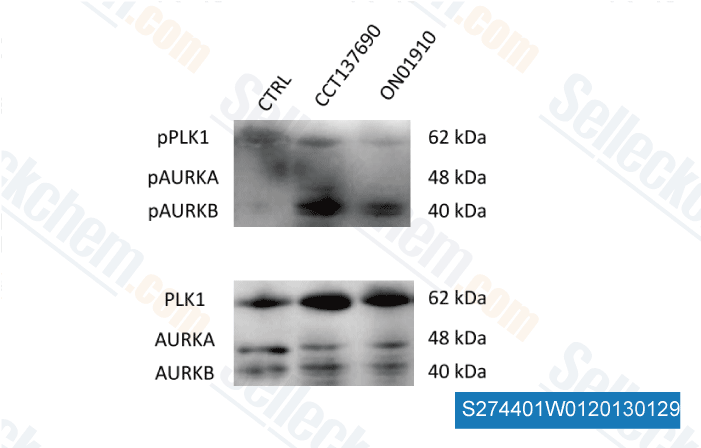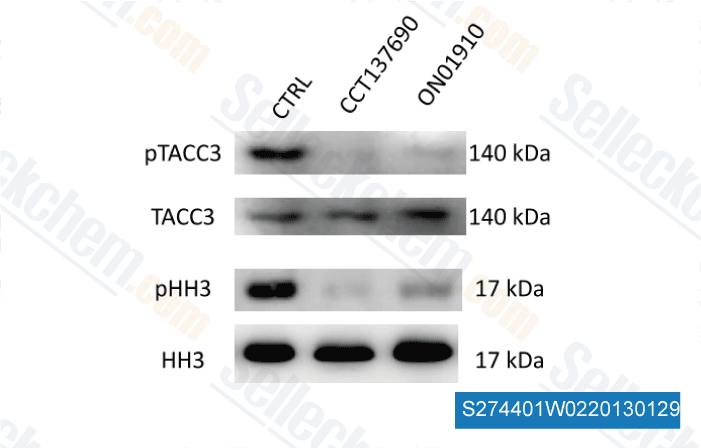|
Toll Free: (877) 796-6397 -- USA and Canada only -- |
Fax: +1-832-582-8590 Orders: +1-832-582-8158 |
Tech Support: +1-832-582-8158 Ext:3 Please provide your Order Number in the email. |
Technical Data
| Formula | C26H31BrN8O |
|||
| Molecular Weight | 551.48 | CAS No. | 1095382-05-0 | |
| Solubility (25°C)* | In vitro | DMSO | 4 mg/mL (7.25 mM) | |
| Water | Insoluble | |||
| Ethanol | Insoluble | |||
|
* <1 mg/ml means slightly soluble or insoluble. * Please note that Selleck tests the solubility of all compounds in-house, and the actual solubility may differ slightly from published values. This is normal and is due to slight batch-to-batch variations. * Room temperature shipping (Stability testing shows this product can be shipped without any cooling measures.) |
||||
Preparing Stock Solutions
Biological Activity
| Description | CCT137690 is a highly selective inhibitor of Aurora A, Aurora B and Aurora C with IC50 of 15 nM, 25 nM and 19 nM. It has little effect on hERG ion-channel. | ||||||
|---|---|---|---|---|---|---|---|
| Targets |
|
||||||
| In vitro | CCT137690 displays antiproliferative activity in a range of human tumor cell lines, including SW620 colon carcinoma cell and A2780 ovarian cancer cell with GI50 of 0.3 and o.14 μM, respectively. In addition, CCT137690 also inhibit the phosphorylation of histone H3. CCT137690 inhibits the major cytochrome P450 isoforms (CYP1A2, CYP2A6, CYP2C9, CYP2C19, CYP2D6, CYP3A4) with IC50 greater than 10 μM. However, CCT137690 is a moderate inhibitor of the hERG ion-channel with IC50 of 3.0 μM. [1] CCT137690 effectively inhibits the growth of human tumor cell lines of different origins with GI50 ranging from 0.005 to 0.47 μM. CCT137690 completely inhibits both Aurora A autophosphorylation at T288 and histone H3 phosphorylation at 0.5 μM. CCT137690 induces polyploidy, mitotic aberrations, and apoptosis in HCT116 cells. CCT137690 reduces MYCN levels and GSK3β phosphorylation in the KELLY neuroblastoma cell line. [2] CCT137690 inhibits autophosphorylation of FLT3 and phosphorylation of its downstream targets STAT5 and p44/42 MAPK (Erk1/2). | ||||||
| In vivo | CCT137690 is highly orally bioavailable and inhibits the growth of SW620 colon carcinoma xenografts with no observed toxicities as defined by body weight loss. [1] CCT137690 inhibits growth of MYCN-induced neuroblastoma at a dose of 100 mg/kg. [2] Additionally, CCT137690 achieves target modulation and potently inhibits the growth of subcutaneous MOLM-13 xenografts, with no obvious toxicity or loss of body weight. [3] |
Protocol (from reference)
| Kinase Assay:[1] |
|
|---|---|
| Cell Assay:[1] |
|
| Animal Study:[1] |
|
References
|
Customer Product Validation

-
, , Dr. Antonino Maria Sparta, University of Bologna

-
, , Dr. Antonino Maria Sparta, PhD University of Bologna
Selleck's CCT137690 has been cited by 14 publications
| Macroautophagy/autophagy promotes resistance to KRASG12D-targeted therapy through glutathione synthesis [ Cancer Lett, 2024, 604:217258] | PubMed: 39276914 |
| Selective impact of ALK and MELK inhibition on ERα stability and cell proliferation in cell lines representing distinct molecular phenotypes of breast cancer [ Sci Rep, 2024, 14(1):8200] | PubMed: 38589728 |
| DELs enable the development of BRET probes for target engagement studies in cells [ Cell Chem Biol, 2023, 30(8):987-998.e24] | PubMed: 37490918 |
| RAE1 promotes nitrosamine-induced malignant transformation of human esophageal epithelial cells through PPARα-mediated lipid metabolism [ Ecotoxicol Environ Saf, 2023, 265:115513] | PubMed: 37774541 |
| Selective Impact of ALK and MELK Inhibition on ERα Stability and Cell Proliferation in Cell Lines Representing Distinct Molecular Phenotypes of Breast Cancer [ bioRxiv, 2023, 10.1101/2023.12.19.572304] | PubMed: none |
| Induction of autophagy-dependent ferroptosis to eliminate drug-tolerant human retinoblastoma cells [ Cell Death Dis, 2022, 13(6):521] | PubMed: 35654783 |
| Lysophosphatidic acid suppresses apoptosis of high-grade serous ovarian cancer cells by inducing autophagy activity and promotes cell-cycle progression via EGFR-PI3K/Aurora-AThr288-geminin dual signaling pathways [ Front Pharmacol, 2022, 13:1046269] | PubMed: 36601056 |
| Targeting Aurora B kinase prevents and overcomes resistance to EGFR inhibitors in lung cancer by enhancing BIM- and PUMA-mediated apoptosis [ Cancer Cell, 2021, S1535-6108(21)00383-4] | PubMed: 34388376 |
| DCN released from ferroptotic cells ignites AGER-dependent immune responses [ Autophagy, 2021, 10.1080/15548627.2021.2008692] | PubMed: 34964698 |
| Trypsin-Mediated Sensitization to Ferroptosis Increases the Severity of Pancreatitis in Mice [ Cell Mol Gastroenterol Hepatol, 2021, S2352-345X(21)00196-X] | PubMed: 34562639 |
RETURN POLICY
Selleck Chemical’s Unconditional Return Policy ensures a smooth online shopping experience for our customers. If you are in any way unsatisfied with your purchase, you may return any item(s) within 7 days of receiving it. In the event of product quality issues, either protocol related or product related problems, you may return any item(s) within 365 days from the original purchase date. Please follow the instructions below when returning products.
SHIPPING AND STORAGE
Selleck products are transported at room temperature. If you receive the product at room temperature, please rest assured, the Selleck Quality Inspection Department has conducted experiments to verify that the normal temperature placement of one month will not affect the biological activity of powder products. After collecting, please store the product according to the requirements described in the datasheet. Most Selleck products are stable under the recommended conditions.
NOT FOR HUMAN, VETERINARY DIAGNOSTIC OR THERAPEUTIC USE.
